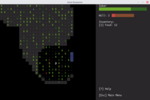The Memory Police by Yōko Ogawa
book, review
This review was originally posted at Goodreads and imported here later on with next to no spell/grammar checking.
4/5 stars
Ooh, what a fascinating book this one. If you read the blurb you might think this is a sci-fi/fantasy mystery novel. It is not and expecting that might disappoint.
It is a slice of life story following one woman (who’s never given a name) living on an island where occasionally, the ruling power declare that something is harmful to the society and will disappear. And for the most part, people stop to notice the object and forget. Those who don’t become the target of the eponymous police.
The book tells a story of the woman, her long-time family friend (referred to as the Old Man) and "R" — her editor. R remembers.
The protagonist is a novelist and we get a glimpse of the story she’s writing. Seemingly completely disconnected from what’s going on at first, but as these things often go, connections will become clearer as time goes on.
I found the focus on memories, what they mean and what happens when they’re lost absolutely fascinating. And this book takes that seriously. There are times when as a reader I forgot (heh!) that an object had disappeared earlier in the story only to be reminded of it by its in-your-face absence later on.
There’s a lot you can read into there: authoritarianism, police state, dismantling of human rights. I don’t know how much of that is intended, but the book (written 28 years ago) is very much open to interpretation.
This is the first book I’ve read from a Japanese writer as well as one set in Japan. I can’t tell how representative it is of the wider Japanese literature, but it feels special and something that would stand out even in that space.
The way it’s written, very little tells you about the place or even time it’s set in. There’s a mention of a "tatami" and when a character learns to type on a typewriter, they start with "a", "i", "u", "e" "o" and "ka", "ki", "ku", "ke", "ko". Those were the only two things that unambiguously placed the story in Japan to me.
None of the characters have a proper name. And while there are no phones or computers, the reader never learns whether that’s because the story is set at a time before them — or whether they’ve been disappeared before the book started.
It is a fascinating story that makes you think for days after it’s finished. It flows really easily and as the it picks up the pace, it’s hard to put down. It’s never truly horrific (though a disappearance of one particular item really shocked me and it was painful to deal with) but there is horror implied and weirdly accentuated by people’s lack of reaction to it as their memories fade away.
I had no idea where it was going, but I’ve very much enjoyed the ride.
